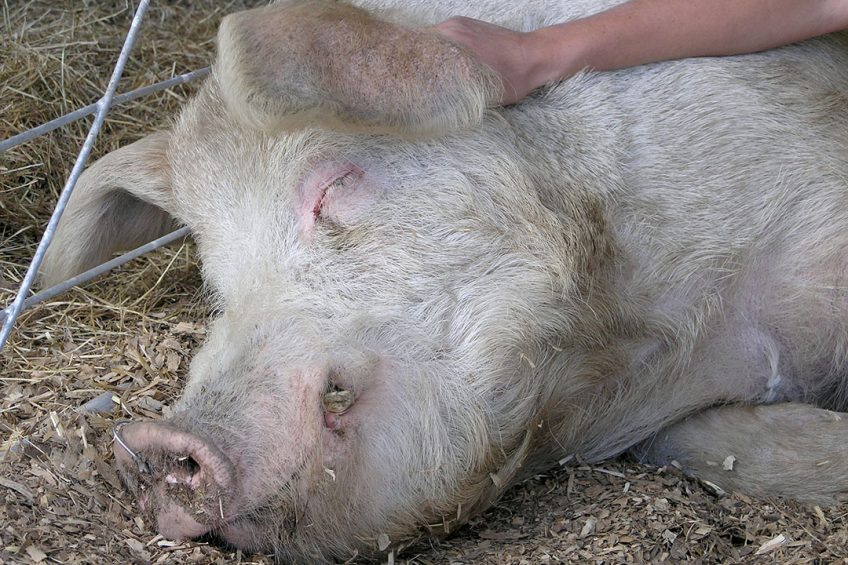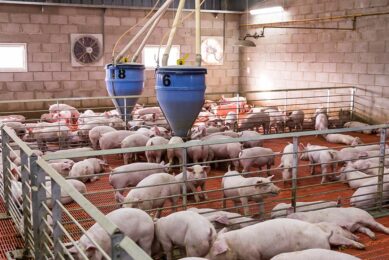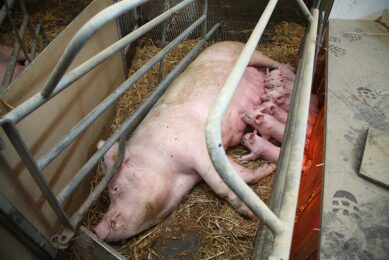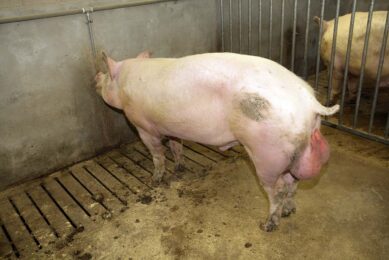Gentle handling does not impact pig performance

Gentle handling of pigs can reduce pigs’ anxiety and increase their willingness to approach handlers, but long-term gentle handling does not seem to have a big effect on pig performance, carcass quality and meat quality.
That was the outcome of a recent trial, carried out by researchers at the Northeast Agricultural University in Harbin, Heilongjiang province, China. The study was published recently in the peer-reviewed publication Animals.
Investigating the effect of gentle handling on pigs
In order to investigate the effect of gentle handling on the behaviour, performance and meat quality of pigs from weaning to slaughter, the team selected a total of 144 6-week-old weaned hybrid piglets from the native Min breed, to perform a 2-phase trial.
First, the researchers divided them into a ‘gentle handling group’ and a ‘control group’, in a total of 18 pens, both groups consisting of 9 pens. All pigs were ear marked for individual identification and were housed under identical circumstances. After 6 weeks of handling (between week 8 to 14), the research team observed and then evaluated the pigs’ responses to a handler with behavioural scores. The team also measured heart rate and production performance.
As a next step, in total 3 pigs were randomly selected from each of the 18 pens and divided into a ‘handling group’ and a ‘control group’ of both 27 piglets. The handling group were given gentle handling until slaughter. Subsequently, the team evaluated meat quality and the production performance of 6 pigs from each group.
Gentle handling treatment
In the paper, the researchers described what kind of ‘gentle handling’ they performed. The gentle handling treatment was performed in these groups between 8am and 10am and between 2pm and 4pm, during 5 days a week. A handler would remain standing still for 2 minutes after entering the pen, and then knelt and gently touched the pigs; the contact lasted for more than 1 minute with each pig.
During the touching period, the handler scratched the pigs’ head, or neck or back with their fingers and spoke to them. The handler spent about 10 minutes in each of the gentle handling pens.

Piglet Health Special
Keeping all piglets healthy from the start right through weaning is a challenge. In this section the focus is on the piglet’s health. When are they healthy and how can we keep them that way?
Scores in approaching-avoidance test
The results show that the approaching-avoidance test scores in handling group pigs, the number of contacts with the handler and absence of contact with the handler, were significantly higher than in the control group pigs.
The occurrences of avoidance and looking at the handler were lower in the handling group than in the control group; however, heart rate was not found to be significantly different between the 2 groups. No significant difference was found in the average daily gain, average daily feed intake, and feed conversion ratio between the 2 groups during the 2 periods.
Anxiety reduction with the pigs
The results indicate that gentle handling could reduce pigs’ anxiety and increase their willingness to approach the handler, increasing the intimacy of the pigs and handlers. However, long-term gentle handling had little effect on pig performance, carcass quality and meat quality.
The researchers closed off the conclusion, saying: “Even so, it is necessary that additional positive or gentle handling should be provided in regular livestock management in order to reduce fear and improve animal welfare in modern pig production.”
The scientific article was authored by Chao Wang, Yongjie Chen, Yanju Bi, Peng Zhao, Hanqing Sun, Jianhong Li, Honggui Liu, Runxiang Zhang, Xiang Li and Jun Bao, Northeast Agricultural University, Harbin, China.
 Beheer
Beheer









 WP Admin
WP Admin  Bewerk bericht
Bewerk bericht